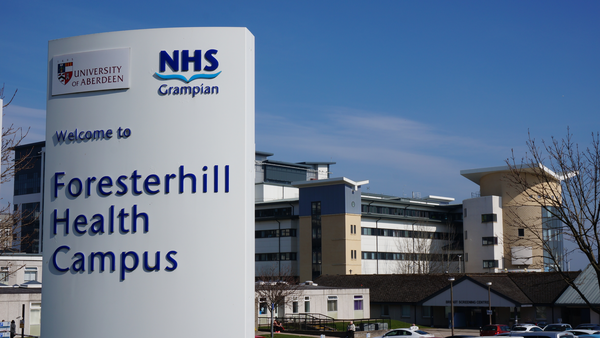Alan Purves

Dentistry in Aberdeen is designed specifically for graduates, capitalising on the knowledge and skills you already have to ensure you become a first-class dental professional.
Our programme has been designed with graduates in mind, enabling you to capitalise on the existing knowledge and transferable skills from your previous degree. From day one, you will be preparing to be a dental professional, benefiting from early clinical problem solving and patient contact, and an integrated approach to learning.
The dental curriculum uses a variety of teaching methods including case based learning. The curriculum aims to:
You will be engaged in reflective practice from an early stage in your clinical experience.
During the course, you will be taught by and observe a wide range of dental professionals from both primary and secondary care services. NHS Education for Scotland (NES), the dental protection organisations and the GDC are also engaged in many of the learning opportunities.
In year 1 you will develop a sound understanding of the oral environment, basic aspects of dental health and disease, together with an appreciation of the principles of patient management, communication and ethical practice. You will begin practical training in the clinical skills lab and have direct patient contact in your second term.
Clinical Dentistry 2 – Year One.
This course is designed to introduce non-restorative clinical dentistry teaching to the BDS Student. The course teaching in BDS 3, 4 and 5 will build on this initial teaching which is composed of key Local Anaesthesia Infiltration and Local Anaesthetic Block teaching and assessment. Teaching within Clinical Dentistry 2 includes the used of learned clinical techniques within our patient clinics.
In year 2 you will have clear understanding of the clinical relevance of the subjects you are learning. You will develop reflective skills in relation to your learning and further develop your clinical and communication skills in the restorative clinics. This regular patient contact is supported by training in the clinical skills lab and will develop your clinical experience in a variety of settings.
This course is designed to build upon the teaching in BDS Year 2, introducing further non-restorative clinical dentistry teaching for the BDS Student.
The course teaching in BDS 4 and 5 will build on this teaching which is composed of key Paediatric Dentistry, Orthodontics, Oral Surgery, Oral Medicine sessions. Teaching within Clinical Dentistry 2 includes the used of learned clinical techniques within our patient clinics.
In year 3 you will continue to develop the ability to apply your knowledge to clinical situations. You will be able to assess the needs of patients and tailor your knowledge to match these. You will be introduced to working within the paediatric, emergency and special care clinics. You will have the opportunity to enhance your clinical skills and patient management in outreach placements and with a number of visits to observe clinicians working in specialist areas of dentistry.
This course is designed to build upon the teaching in BDS Year 2 & 3 within non-restorative clinical dentistry for the BDS Student.
The course teaching in BDS 4 is composed of Paediatric Dentistry, Orthodontics, Oral Surgery, Oral Medicine, and this year introduces Special Care Dentistry sessions.
Teaching within Clinical Dentistry 2 includes the used of learned clinical techniques within our patient clinics.
In year 4 you will hone and apply diverse and multiple areas of knowledge within integrated oral care. This will include team working, ethical applications and management skills. You will be expected to complete and present several full and complex cases to demonstrate a high level of clinical skill and understanding.
This course is designed to build upon the teaching in BDS Year 2, 3 & 4 within non-restorative clinical dentistry teaching for the BDS Student.
The course teaching in BDS 5 is composed of Paediatric Dentistry, Orthodontics, Oral Surgery, Oral Medicine, and Special Care Dentistry sessions.
Teaching within Clinical Dentistry 2 includes the used of learned clinical techniques within our patient clinics.
We will endeavour to make all course options available. However, these may be subject to change - see our Student Terms and Conditions page. In exceptional circumstances there may be additional fees associated with specialist courses, for example field trips.
The course has been designed specifically for graduates and encompasses a variety of modern educational methods for teaching and learning. There is a focus on independent and reflective learning whilst clinical work is introduced from year 1 to maximise clinical experience.
Teaching and learning strategies have been designed to meet the needs of a more mature student group with previous experience of university education and appropriate transferable skills.
A range of assessment methods are used including written examinations, such as single best answer questions and clinical scenario papers, and other practical exams. Objective clinical assessment of your clinical skills will be carried out by means of Objective Structured Clinical Examinations (OSCE) and Structured Clinical Objective Testing (SCOT) at appropriate stages. In your final year more amalgamated assessments will be used to assess your clinical skills by means of an Integrated Structured Clinical Examination (ISCE) and an assessment of some cases that you would have treated during your four years at the Institute of Dentistry.
A range of assessment methods are used including:
The exact mix of assessment methods differs between subject areas, year of study and individual courses.
The information below is provided as a guide only and does not guarantee entry to the University of Aberdeen.
The entry requirement for admission is a good Honours degree (First or Upper Second-Class) in a medical or health-related science degree (e.g. biomedical science, anatomy, pharmacy). Candidates with a first degree in medicine will also be considered.
The admissions process also involves suitably qualified applicants sitting an entrance test (UCAT) and the scores obtained are used with other criteria to select for interview. All applicants must complete this test in the year prior to entry. For more information on the UCAT test, including registration dates, please refer to the UCAT website.
The entry requirement for admission is a good Honours degree (First or Upper Second-Class) in a medical or health-related science degree (e.g. biomedical science, anatomy, pharmacy). Candidates with a first degree in medicine will also be considered.
The admissions process also involves suitably qualified applicants sitting an entrance test (UCAT) and the scores obtained are used with other criteria to select for interview. All applicants must complete this test in the year prior to entry. For more information on the UCAT test, including registration dates, please refer to the UCAT website.
Training to become a dentist involves extensive and dedicated study, both as an undergraduate and life-long continuing professional development after qualification.
To avoid the disappointment of non-completion of a degree, or disillusionment with a subsequent career in dentistry once entered into the course, we need to ensure that applicants are entering this profession with their eyes open and understand the implications and commitments of such a career.
It is important to understand that there are Academic Requirements as well as Non-Academic Requirements for dentistry. In addition, all applicants must take the UK Clinical Aptitude Test (UKCAT).
The information displayed in this section shows a shortened summary of our entry requirements. For more information, or for full entry requirements for Dentistry degrees, see our detailed entry requirements section.
To study for an Undergraduate degree at the University of Aberdeen it is essential that you can speak, understand, read, and write English fluently. The minimum requirements for this degree are as follows:
IELTS Academic:
OVERALL - 7.0 with: Listening - 5.5; Reading - 5.5; Speaking - 7.0; Writing - 6.0
TOEFL iBT:
OVERALL - 100 with: Listening - 21; Reading - 22; Speaking - 28; Writing - 21
PTE Academic:
OVERALL - 70 with: Listening - 59; Reading - 59; Speaking - 70; Writing - 59
Cambridge English B2 First, C1 Advanced or C2 Proficiency:
OVERALL - 185 with: Listening - 162; Reading - 162; Speaking - 185; Writing - 169
Read more about specific English Language requirements here.
Students undertaking Education, Medicine or Dentistry programmes must comply with the University's fitness to practise guidelines.
You will be classified as one of the fee categories below.
| Fee category | Cost |
|---|---|
| EU / International students | |
| Tuition Fees for 2026/27 Academic Year | £50,100 |
| Home Students | |
| Tuition Fees for 2026/27 Academic Year | £1,820 |
| England, Wales, Northern Ireland, and Republic of Ireland | |
| Tuition Fees for 2026/27 Academic Year | £9,790 |
View all funding options in our Funding Database.
Our programme will lead to full GDC registration. The majority of new dental graduates move straight into a one year period of Foundation Training (Vocational Training) in NHS general practice. Successful completion leads to the award of a Vocational Training Number – an essential pre-requisite for taking up a contract with a Health Board to provide NHS dentistry in General Dental Practice or in the Salaried Dental Service. A minority of dentists will complete a second year of Foundation Training – generally in two hospital posts – or will have been employed in a two year post blending primary and secondary care experience. Completion of two years of Foundation Training and attaining Membership of one of the Royal Colleges is the usual route into Specialty Training, leading ultimately to employment as a NHS Consultant.
Following vocational training, a dentist may work as an associate, partner or principal in general practice, join the community dental service, the armed forces dental service, work in a hospital with a view to becoming a consultant, or become a clinical academic contributing to the training of the next generation of dental graduates.
Within the Institute of Dentistry we work side by side with NHS Grampian Dental professionals, including the Restorative & Orthodontic Consultant teams, the Dental Nursing team and NHS Laboratory Staff. As well as this we have local General Dental Practitioners supervising within our student restorative clinics. You will also spend time during the later years of the course with members of the Oral & Maxillio-facial Department and colleagues at Aberdeen Health Village.
You will be taught by a range of experts including professors, lecturers, teaching fellows and postgraduate tutors. However, these may be subject to change - see our Student Terms and Conditions page.
The Institute of Dentistry is based in a purpose built facility on the Foresterhill Health Campus. The complex features facilities for oral surgery, dental accident and emergency, restorative dentistry, integrated oral care, orthodontics, paediatric dentistry, dental imaging as well as dental laboratories and office accommodation.

The Foresterhill Health Campus is one of the largest clinical complexes in Europe which includes the Medical School, large teaching hospital, the Institute of Medical Sciences and the Rowett Institute.

A dedicated Medical Library on the Foresterhill Health Campus and the fantastic facilities in the Sir Duncan Rice Library at King’s College, are complemented by online access to the key medical and health sciences journals and textbooks.
Discover Uni draws together comparable information in areas students have identified as important in making decisions about what and where to study. You can compare these and other data for different degree programmes in which you are interested.